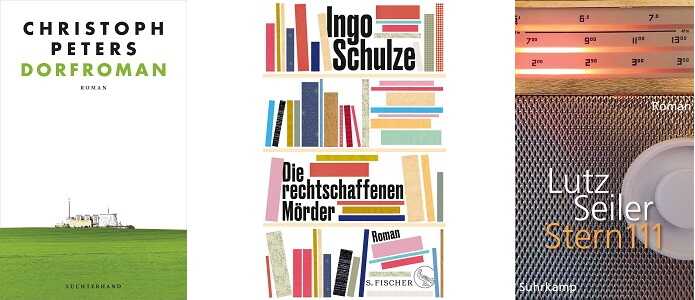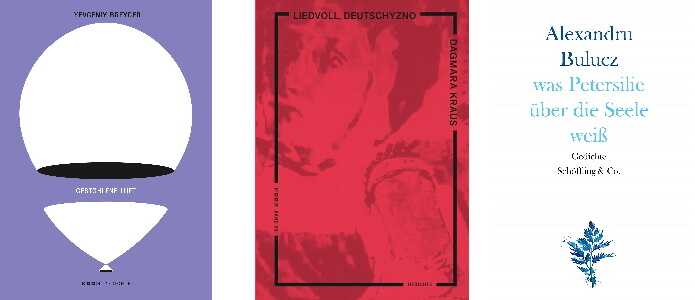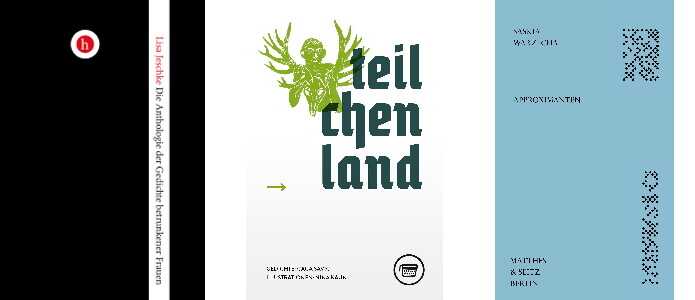Bookworld
Where we come from

The search for identity, village tales, German lives: despite the corona virus 2020 is a strong year for books
By Christoph Schröder
Like everything else, the German book trade has been seriously affected by the Covid19 crisis. Although sales figures for June 2020 were unexpectedly strong, both booksellers and publishers will end up making a loss across the 2020 financial year as a whole. What with the cancellation of the Leipzig Book Fair and the ban on literary and other events, the reading public has had little opportunity to appreciate the full breadth of the unarguably high-quality output of new books this spring. As is evident from a new initiative launched by a countrywide network of literary event organisers, efforts are currently being made to re-launch these books - but the new autumn titles will already be in the shops by the end of July.

It has to be acknowledged, however, that a migrant background is not indispensable to a convincing representation of the present-day world in this era of turmoil characterised not least by the disparities between people’s different experiences of reality. Thus for instance Elbwärts (‘Elbe-wards’) is due to be published in late August as the first novel by Thilo Krause, a writer known hitherto solely as a poet and as a winner of the distinguished Peter Huchel Prize for Poetry. Krause, born in Dresden, recounts in vivid, picturesque language the story of a couple who return to their home village in the region known as ‘Saxon Switzerland’. The past catches up with the first-person narrator in the form of guilt-stricken memories, while in the novel’s present nazis arrive and set up their summer camp, and the couple themselves are faced with rampant mistrust in the village. As is already clear from the title, Christoph Peters also focuses on village life in his Dorfroman (‘Village novel’), due out in August. In his fabulous 2012 novel Wir in Kahlbeck (‘We in Kahlbeck’), Peters - born in the Lower Rhein area of Germany - recounted the story of life in a Catholic boys’ boarding school near the Dutch border. Now, after a series of entertaining and highly intelligent forays into the detective-story world, Peters takes a new turn with his Dorfroman, in which the narrator goes to visit his parents in the village of ‘Hülkendonck’. Here again, returning home sparks a plethora of memories, and by the point where the novel’s main focus shifts to the construction of a nuclear power plant and the resulting ideological battles, it is already clear that ‘Hülkendonck’ bears a more than passing resemblance to Peters’s own home village of Kalkar.
Two of the most notable books published so far this year deal with East German lives and experiences. Ingo Schulze’s cleverly constructed novel Die rechtschaffenen Mörder (‘The righteous murderers’), which was nominated for the Leipzig Book Fair Prize, reconstructs the story of a bookseller and antiquarian who in GDR days became a beacon of intellectual opposition, but lost everything once the wall fell: his means of earning a living, his standing within society, the entire basis of his intellectual life. No one needs him any more, no one wants to see him. Although it is left open whether he becomes truly radicalised and morphs into an enragé from the ranks of the well-educated middle class, Schulze’s novel nonetheless illuminates a pan-German problem, namely the ease with which someone who feels misunderstood can re-cast themself as an enemy of the system.

Self-affirmation, accounts of the coming-together of the country we live in, the experience of cultural heterogeneity - all those elements that we associate with the notion of ‘identity politics’ are still being richly reflected in current German-language literature. Despite the corona virus, 2020 is an excellent year for books!
Christoph Schroeder is a freelance writer (Süddeutsche Zeitung, Tagesspiegel, Die Zeit) based in Frankfurt am Main and is a lecturer in literary criticism at the university there.
Translated by John Reddick
Bookworld
Poems at the Dew Point

Current tendencies in German-language poetry
by Beate Tröger
“Poetry is vital. It performs social work and the only way it can do this is poetically,” writes the poet Elke Erb, who was awarded the 2020 Georg Büchner Prize for her life’s work in letters. The poets Monika Rinck and Steffen Popp have selected poems from Erb’s oeuvre and collected them in Das ist hier der Fall (That’s the case here). The title of the volume is taken from a poem written in 2018: “I wake up / and discover a note that says: / I don’t give a hoot / I always read in the morning / “the bright blue brook” / (with the forget-me-not / in the margin). / And: my horse is in the stall. / The point of a horse isn’t to reveal itself. / The peacock wears all of its resplendent plumage on its back. / It doesn’t have a clue. / I’ll go pick some flowers. That’s the case here.” Calm like the horse and oblivious like the peacock to questions of beauty, a more precise definition is given for the social work of a poem that is absorbed in the daily comings and goings and in what’s to be discovered. Its rebellion lies within these elements and in the poem’s inability to be economically of use, its supposed marginalization.
In 2020, a year that was extremely rich in impressive volumes of poetry, numerous volumes were published that can be read as such an act of rebellion, as a challenge, vigilantly investigating what is said and how beyond the discourses of relevance and ideological trench warfare. But these volumes cannot all be measured with the same yardstick, since, after all, the search for their own voice is characteristic of such work.
Nimbus, the celebrated fifth volume of poetry, by Marion Poschmann (born in Essen in 1969) searches for an adequate language to describe natural phenomena in the age of the Anthropocene, where humans exert their influence on the environment in an unprecedented manner. This volume discreetly negotiates how (artistic) speaking, thinking and behavior co-determine their relations.
The opening poem, entitled “Und hegte Schnee in meinen warmen Händen“ (“And nurtured snow in my warm hands”), at first appears to be nurturing but turns out to be a work of destruction: mountains explode in the poem not because of the violence of nature but because of the violence of humans. But whether the lyrical I is aware that it also bears some responsibility is an unanswered question. As such, readers are also at liberty to consider this question with regards to their own lives.

Poetry’s propensity to song and rhythm are celebrated in the book kommen sehen (see coming) by Anja Utler (born in Schwandorf in 1973). Written in strict couplets, Utler’s long poem takes place in a future where water has become scarce and where men are no longer necessary for the survival of humankind. Three women from three generations speak. But are they speaking with one another? Or against one another, thus demonstrating that the bane resides in the destructive power of speech that does not rely on understanding? Coming from a different direction than Nimbus, kommen sehen critically reflects on the responsibility of the individual.
Strict attention is also paid to form in Dämonenräumdienst (Demon Clearing Services) by the Georg Büchner Prize winner Marcel Beyer (born in Tailfingen in 1965) and in Im Glasberg (In the Glass Mountain) by Nadja Küchenmeister (born in Berlin in 1980). While all of the poems in Beyer’s volume consist of ten stanzas with four lines in each stanza, Küchenmeister mostly arranges the stanzas in tercets. And while the poems in Dämonenräumdienst humorously dispose of demons as being mere servile spirits of a dubious esotericism at the cost of enlightened thinking—“I learned that even in the most peaceful / idyll, there’s a homeopath – a / homeopath who is capable of everything”—Küchenmeister’s lyrical I comes to terms with the past, with the false promises of fathers and lovers in a manner that is visually powerful, self-critical, and sometimes cold: “we’ll never see one another again / you remember me, I remember // you, no one really cares. I admit / I’d prefer that. I remember remembering // even more I remember nothing.”


Joy in playing with language and the desire to understand poetry as a corrective force can be discerned in numerous debuts of the year. Lisa Jeschke’s Die Anthologie der Gedichte betrunkener Frauen (The Anthology of Poems by Drunk Women), Caca Savic’s Teilchenland (Particle Country) or Saskia Warzecha’s Approximanten (Approximants) confidently and skillfully survey the tension between inquiring and making statements, between experiences of art and the world. Erb’s heirs emphatically attest to poetry being vital and a social labor.
Beate Tröger
Beate Tröger is a journalist, critic and presenter. She writes reviews for Deutschlandfunk, SWR, Freitag and the Frankfurter Hefte, amongst others. Tröger is also a member of the jury of the Peter Huchel Prize for German-language poetry.
Translated by Shane Anderson